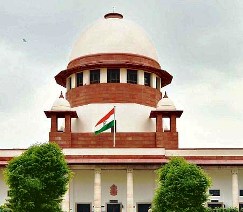The Supreme Court will take up the petition challenging the 10% quota for the poorer sections to see if a five-judge constitution bench needs to look into the constitution amendment.
The petition challenging the constitution amendment Act contends that the law alters the 1“basic structure” of the Constitution.
The PIL argues that the new quota law is breaking the cap of 50% total reservation in jobs and education fixed by the top court in the M Nagaraj case in 2006. Under the existing constitutional arrangements, reservation in jobs and education is available to the members of the Scheduled Caste (SC), Scheduled Tribe (ST) and Other Backward Classes (OBC) communities.
The petition cites a Supreme Court order by a nine-judge bench in 1992 Indra Sawhney case stating that economic backwardness cannot be the basis of reservation in jobs and education. “Such an Amendment is hence, vulnerable and ought to be struck down as it merely cancels a binding judgement,” says the PIL.
The PIL has also challenged the new quota law on the ground that the amendment provides for reservation in private unaided educational institutions, which has been clearly barred by the top court through two previous judgments.
The legislation got Parliament’s approval earlier this month amid Opposition parties questioning the Union government’s hurry in pushing the bill through months ahead of 2019 Lok Sabha elections and in the aftermath of the BJP’s defeat in the Hindi heartland states of Rajasthan, Madhya Pradesh and Chhattisgarh.
The court had in January sought a response from the Centre while refusing to stay the executive order and subject the new appointments to the outcome of the case. The Centre is likely to file its response within the day.
The court has listed the matter for March 28, when it will take up the petitions to see they have to be heard by a constitution bench.


